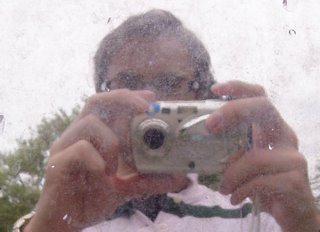9
9)
Dogville
Dir. Lars Von Trier
177 min; Starring Nicole Kidman, Paul Bettany, Lauren Bacall, James Caan, Stellan Skarsgård, and John Hurt
"Whether Grace left Dogville, or on the contrary Dogville had left her - and the world in general - is a question of a more artful nature that few would benefit from by asking, and even fewer by providing an answer. And nor indeed will it be answered here."
Dogville is a challenging film. That much can be said for certain. It's not an easy film to watch. Definitely not one that you're going to sit down and enjoy yourself during, but I believe that it is a rewarding and powerful experience if one engages the film in the right spirit. Some don't like the film and find it to be pretentious and extreme. I beg to differ.
Much like Dancer in the Dark and Breaking the Waves before it, Dogville tells the story of a woman wronged. Grace (Nicole Kidman) comes to the small Rocky Mountain town of Dogville because she is hiding from gangsters, and Tom Edison, Jr. (Paul Bettany) convinces the townsfolk to hide Grace, because she might have "plenty to offer Dogville." What transpires is both challenging and disturbing, with an ending that is possibly as powerful as any I've seen all year.
Von Trier is an expressionist filmmaker. Some accuse him of making films with gimmicks. In Dancer, he had Selma (Björk) break into hyper-realistic song and dance numbers. Here Von Trier is interested in pure storytelling, and he abstracts his set to the extreme. The film's set is merely a series of partial props and white lines on the floor signifying rooms and houses. Even the town dog is merely a marking on the floor (I wasn't kidding when I said this film will challenge even most serious art film buffs). This level of abstraction is hard to watch at first, but it becomes evident how this is effective.
Von Trier has been called a sadist by some, but I think that this is a film that doesn't merely revel in the depravity of mankind. This is like the film version of the Book of Job. It doesn't shy away from the horror of life. Comparisons to the great Bertolt Brecht, including the play-like structure and design of the film, are warranted. Like Brecht, Von Trier is interested in challenging us and instructing us through his films. The effect of distancing his audience from the film, through the abstract set, is to help us to focus more on what is being said and the ideas that the film is raising. The film is filled with allusions, symbolism, and dialogue that works on multiple levels. Even the characters names are filled with meaning. Comparison with biblical parables are, I believe, intentional.
This kind of film is an English majors dream film, requiring thought and reflection for it to yeild its rewards. Not every film I see needs to be this demanding and intelligent, but it's a treat to get something like this every once and while.
Note: I would love to have a screening of this film with some other people who are interested in a discussion afterwards. I'll try to organize something in the next couple of months.


0 Comments:
Post a Comment
<< Home